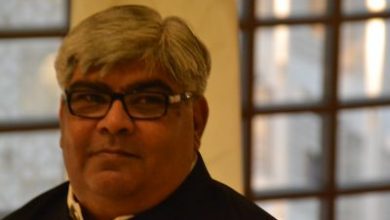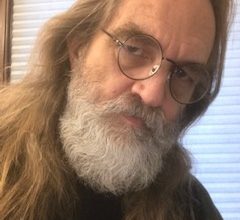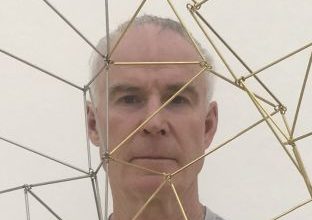Believer
In the midst of an August heatwave in Los Angeles, Elliot Feldman woke up in a cold sweat at 3 in the morning with a startling realization: he no longer believed in God. Had he been a doctor, lawyer, or architect, such an awareness might have been mildly, or perhaps even moderately troubling. But Elliot Feldman was a rabbi.
In contrast to his local contemporaries – Rabbi Menachem Finkelstein, whose conduct and attire seemed better suited to a 19th-century Polish shtetl than to sunny Southern Calfornia; and Rabbi Deborah Rothman, who insisted upon using she and her when referring to The Almighty – Feldman had long considered himself to be guided by faith rather than by tradition or political correctness. Yet for the first time in his adult life he found himself to be missing the faith that had long motivated and sustained him.
Not wanting to disturb his wife Rachel, who was snoring ever so sweetly beside him, Feldman began to recognize that what seemed at first like a sudden revelation had actually long been in the works. Wars had always troubled him, as had cruelty, suffering, and what appeared
to be, in his lifetime at least, an exponential increase of inhumanity. Four years of an administration that locked kids in cages while undermining the separation of church and state exacerbated Feldman’s feelings. Then came the pandemic, which shook him profoundly, not merely because of the loss of life, but also due to the surge in the income inequalities that to him were abhorrent.
Needing to talk to a kindred spirit, but reluctant to share his feelings with coreligionists, Feldman reached out to a fellow member of the local Interfaith Council. Over chai tea with Peter Rumsey, Pastor at a nearby Episcopalian church, Feldman awkwardly detailed his
predicament, then was met by an unexpected chuckle. “What took you so long?” Rumsey queried.
“You, too?” asked Feldman.
“How could I not?” the clergyman stated, explaining that for him the defining moment, after years of slowly-increasing doubts, came when three days in a row he was called upon to provide succor for congregants in desperate need. First was a family whose eight-year-old son was diagnosed with brain cancer. Next, a husband who had to choose between saving a wife with a life-threatening illness or the infant she was carrying whose survival was in jeopardy. Then came a woman with four kids who was facing homelessness after her husband suffered a stroke.
“How do you go on?” asked Feldman.
“What else am I supposed to do?” joked Rumsey. “Go to law school? Rob a bank? Like you, I’ve got mouths to feed. More importantly, must I be a zealot to provide solace, support, or a code of proper behavior?”
“Still –” said Feldman.
“Look,” continued Rumsey, “I know full well I have parishioners who show up to see and be seen. And who feel that playing good Christian on Sunday morning allows them to behave like shitheads the rest of the week. But if there are those – even a few – to whom I can provide a moral compass, or help in times of need, maybe in my own small way I’m making the world a slightly better place.”
Despite the comfort of knowing he was not entirely alone, Feldman had yet another night of tossing and turning until, fearful of waking Rachel, he climbed out of bed and curled up on the living room sofa. There he found himself thinking about his unlikely journey. As a kid growing up in not yet gentrified Culver City, his interests had been mainly sports, girls, pizza,
and the old vinyl Blues and R&B albums he searched for in used record stores that had long since vanished. It wasn’t until a summer spent on a kibbutz in Israel that being Jewish meant more to him than bagels & lox, pastrami, and getting through a Bar Mitzvah that meant more to his grandparents than it did to him. His awareness of Jewishness increased significantly when he spent a semester in Israel during his junior year of college. More important than the exponential surge in his command of Hebrew was his ever-growing sense of not just being a Jew by dint of birth, but of what it meant to live a Jewish life. Then came a course on modern Jewish writing – Roth, Mailer, Gertrude Stein, J.D. Salinger, Clarice Lispector, Isaac Bashevis Singer, and others – which intensified his interest in both Jewishness and Judaism. That led Feldman to an even greater plunge into literature of, by, and about Jews: Maimonides, Herzl, Kafka, Gershom Scholem, Primo Levy, Irene Nemirovsky, Nathalie Sarraute.
Still, it surprised his family members and his childhood friends when, as graduation neared, instead of choosing a career in law, or alternatively entering father’s wholesale produce business, Feldman applied to the Jewish Theological Seminary.
As the first rays of sunlight appeared, Feldman shot off an email to his administrative assistant, asking Miriam to reschedule all his morning appointments. Then, uncharacteristically, he threw on a t-shirt and a pair of jeans and drove toward the beach.
Strolling down Ocean Front Walk in Venice among the joggers, skateboarders, dog walkers, and panhandlers, Feldman alternated his gaze between the ocean and the colorful murals for which the area was justly known, then stopped suddenly and shook his head. What greater irony could there be, he wondered, than a nonbeliever wishing, hoping, praying for some kind of sign from God?
Turning onto Windward, where Orson Welles filmed the opening sequence of “Touch Of Evil,” Feldman stopped to study a huge mural called “Touch Of Venice,” which paid homage to
Welles’ film, albeit with the wonderfully incongruous addition of an Edsel. Then the rabbi pulled out his phone and called another member of the Interfaith Council.
“Think you’ve got it tough?” asked Father Tim Byrnes as he and Feldman lunched on fish tacos and margaritas at a Mexican place in Culver City. “Think it’s fun having to deal with people who consider abortion a sin, but have no problem consigning migrant kids to a life of poverty?”
Feldman winced.
“And what you call kvetching?” Byrnes continued. “Think that compares to the bellyaching I have to put up with in confession? There are times I want to rip off my clerical collar and burn it! And what do you think’s the toughest part of all?”
“I give up,” replied Feldman.
“Ever heard of celibacy?”
“Ouch.”
“Ouch is right! Worst of all, since the clergy scandal, there’s the presumption that all priests are perverts and pedophiles unless proven otherwise. “
“Since you mentioned it,” interrupted Feldman. “How in the world did that happen on such a global scale?”
“Don’t you know the quote?”
“Which one?”
“They dress us like women, treat us like children, then expect us to behave like men.” Feldman could not hold back a sigh.
“So do I lose faith?” Father Byrnes then asked. “Do dogs have flees? Do sharks get hungry? At this point in my life, faith is almost irrelevant.”
“So how do you go on?” Feldman wondered aloud.
“Someone has to. I may not be great at it. I may not even be as good as I was when I was still an eager-beaver. But I try. And once in a while I even get to feel good. If you don’t mind my asking, how old are you?”
“Forty-two,” replied Feldman.
“Well, I’ve got you by ten years. What else am I going to do? With a bum leg and high blood pressure, it’s not like I can be a big help in some third-world country. Or suddenly become a sensitive novelist. Am I a believer like I used to be? Do I really think that the Red Sea was parted? Or that God who impregnated Mary? I’ll plead the Fifth. And by the way, if she was the Virgin Mary, what’s that say about Joseph? Don’t quote me, but suffice it to say I’m sceptical. So what’re my alternatives? Want to guess?”
“Quit, or do the best you can.”
“Bingo!” shouted Father Tim. “If that makes me a hypocrite, so be it.”
At work the next three days, even while making preparations for the High Holidays, prepping the Hebrew School curriculum for the Fall, and double-checking Bar and Bat Mitzvah schedules for the months ahead, Feldman was largely operating on automatic pilot.
That was also the case at home, whether playing catch with his son Greg, kicking a soccer ball with his daughter Lisa, or partaking in a family dinner. No matter the time of day, the activity, or the person or people he happened to be with, Feldman’s strange thoughts were never fully out of mind.
As he was shaving one morning, he was surprised when Rachel entered the bathroom. “Want to talk?” she inquired.
“About?” Feldman responded.
“The birds, the bees, or whatever’s possessing you.”
“Why do you think something’s possessing me?”
“Elliot, it’s not as though I don’t know you. At first I thought you were preoccupied about something, but this goes way beyond preoccupied.”
Feldman bit his lip. “There are some things I’ve got to work through.”
“Well,” said Rachel, “if you want to talk, get me while I’m here.”
Feldman eyed his wife strangely. “While you’re here?”
“Who knows?” she teased. “Maybe I’ll fly off to Paris, or Havana, or Beijing.” “Like you’ve done so many times before?” joked Feldman.
“Hundreds of times,” countered Rachel. “Thousands. I’m here if you need me.” “I always need you,” answered Feldman.
Though generally meticulous in his preparation. Feldman woke up on Saturday morning aware that not one moment’s thought had been given to the weekly rant known by others as his weekly sermon.
Customarily, on Friday morning Feldman would seize either a current event or some nugget from the week’s Torah portion. He would work an hour or two at his computer, laboring over a first draft, then fiddling, cutting, and tweaking until he was reasonably satisfied. A brief walk would follow, after which he would finish polishing his discourse.
Still grappling with his crisis of faith, Feldman made a conscious decision. Instead of acting like a high school student who forgot about a homework assignment, he would not scribble something in haste. What he would do, he vowed silently to himself, is trust his unconscious – allowing whatever thoughts, ideas, or notions were flooding his mind to pour forth.
Nervous yet strangely liberated, Feldman felt like he was floating while driving to the synagogue on Saturday morning. There, alternating between moments of excitement and dread, he and the cantor conducted the service until it was time for him to give his address.
“What do we think of when we think about God?” Feldman found himself saying. “Do we think of a benevolent God? A protective God? A wrathful God? A vengeful God? And how do we see Him – or as some now say, Her? Is our God a Moses-like figure with long flowing hair and a full white beard?”
Feldman paused to gaze at his stunned audience.
“But what if,” he then continued, “instead of a God, there are numerous gods, or even countless gods. And just so you know, I don’t mean in the same way as the ancient Greeks or Romans – what we call polytheism. But – and it’s a serious but – what if there’s something godlike nearly everywhere we turn? What if every bird, every tree, every bit of sunlight, and every waterfall is somehow imbued with godliness in its own special way? What if every puppy and kitten is not merely a source of wonder and joy, but also a reminder, like the flowers that bloom every Spring, of the magic of our existence?”
Once more Feldman took a moment to peer at the congregants.
“Are the stories passed down to us true?” Feldman proceeded to ask rhetorically. “Or are they meant to be lessons of a sort? Perhaps they’re parables, reflecting the ancients’ attempt to create order out of a world in chaos. Sure, there are those for whom the Bible is literal, with every word true. Why is that potentially a problem? Because most of those making that claim can only read English, French, or maybe Spanish. But guess what. The Old Testament – our Bible – was written in Ancient Hebrew and Ancient Aramaic. So what does that mean? Unless you’re fluent in those ancient languages, what you’re reading is a translation. And what’s a translation? An interpretation.”
Yet again Feldman looked out upon his flock.
“Wouldn’t it be a better and happier world if we could somehow manage to see God everywhere?” he asked them. “And in everything?”
At the Kiddish that followed the service, while some members of the congregation were nibbling on challah or sipping Maneschewitz, Feldman, was approached by others. Some, as always, simply wanted to say hello, and others wanted information about upcoming events. But there were a few who asked about specific items in the sermon.
Confronted by their questions, Feldman nearly panicked. Whereas he had nearly total recall of his talks given over the years, the thoughts expressed morning on the morning in question were a total blank. Though the words had come from him, and had clearly had impacted many of those present, Feldman had absolutely no sense whatsoever of what he had expressed.
To cover the gap he couldn’t explain, Feldman found a way to placate the questioners. “Think of today’s sermon as food for thought,” he told them. “Let the ideas percolate, then see where they lead.”
“You seem confused,” Rachel said to her husband when he entered the kitchen where she was preparing lunch.
“Seem?” Feldman replied. “I am confused.”
“Crisis of confidence?” she asked. “Crisis of faith? It doesn’t seem to me like just an extended case of the blues.”
“How come you’re so smart?” Feldman said, giving her a kiss.
“You mean because I married you instead of Gene Horowitz?”
“Among other things… I wish I knew why Jews are so plagued with doubt.” “Want to know why?” asked Rachel.
“Tell me.”
“Three thousand years of genetic programming.”
As Feldman climbed into bed that night, Rachel looked up from the Pynchon novel she was re-reading. “Know who I think you ought to talk to?” she asked.
“Who?”
“Your friend the Roshi’s really good at cutting through confusion. I think you should call him in the morning.”
“Nope,” said Feldman.
“Why not?
“I called him after dinner to set a get-together for Monday.”
“In Buddhism there’s a name for what you’re going through,” Ken Nakamura of the local Zen Center told Feldman while sipping green tea. “Monkey Mind. But as awful as if feels, it’s actually a good sign.”
“Sure fooled me,” replied Feldman unhappily.
“Doubt can be a step to a higher truth. What words exactly are giving you trouble?” Feldman sighed. “Religion… Plus a three-letter word starting with G.”
“I’m assuming you don’t mean gum,” state the Roshi.
“Yup.”
“Deny them,” advised Nakamura. “Let’s begin with the first word. If I tell you to ignore all the trappings and mumbo-jumbo of Judaism, Christianity, Islam, Buddhism, or whatever, what’s left?”
“I give up.”
“A philosophy. Or a guide to living. How much better would the world be if everyone followed the Ten Commandments, the Sermon On The Mount, or the teachings of the Buddha?” “Infinitely,” answered Feldman.
“I can bend your ear for hours about the Three Jewels of Buddhism: the Buddha, the
Dharma, and the Sangha. Or I can define Buddhism more succinctly. Ready?” “Sure.”
“Buddhism is picking up after your dog whether somebody’s watching or not. Meaning?” “Tell me,” said Feldman.
“Interconnectedness. That’s more important than all the ceremonies, rituals, pomp, and bullshit put together. How can any of us really know if there is a God? Or if there is, what he, she, or it might possibly be like? But what we can do – should do – maybe even must do – is behave in as close to a godlike fashion as possible. But you’re a smart guy, so none of this should be new to you. What’s the purpose of a Zen slap?”
“I give up.”
“To shake up knowledge you already have. Why? To grasp what you already knew but just hadn’t been able to see. Make sense?”
With unexpected clarity, Feldman nodded.
Pulling into the parking lot of a nearby park, Feldman strolled toward a bench, then gazed out at kids cavorting in a playground while the Roshi’s message continued to resonate. His calling, if he dared use such a term, had little, he realized, with God, or even the trappings of Judaism, no matter how much some of them had appealed to him. Nor did it owe to the trend toward chopped liver Torahs or Star Wars Bar Mitzvahs. For Feldman the lure, and allure, had always been the opportunity to preserve traditions that had endured for centuries while also providing guidance for a community that, despite its faults, he cherished. As long as he possessed a strong sense of spirituality, Feldman now understood, there was no need to worry about nomenclature or jargon, or about the excesses that often drove him batty.
Instead he could preside over the key events of life – births, bar and bat mitzvahs,
weddings, and funerals – all the while sustaining – and in turn being sustained by – that rarest of things in the modern world, a sense of community. Hopefully that would be enough to quell any recurrence of his doubts.
About the author
Alan Swyer is an award-winning filmmaker whose recent documentaries have dealt with Eastern spirituality in the Western world, the criminal justice system, diabetes, boxing, and singer Billy Vera. In the realm of music, among his productions is an album of Ray Charles love songs. His novel ‘The Beard‘ was recently published by Harvard Square Editions









